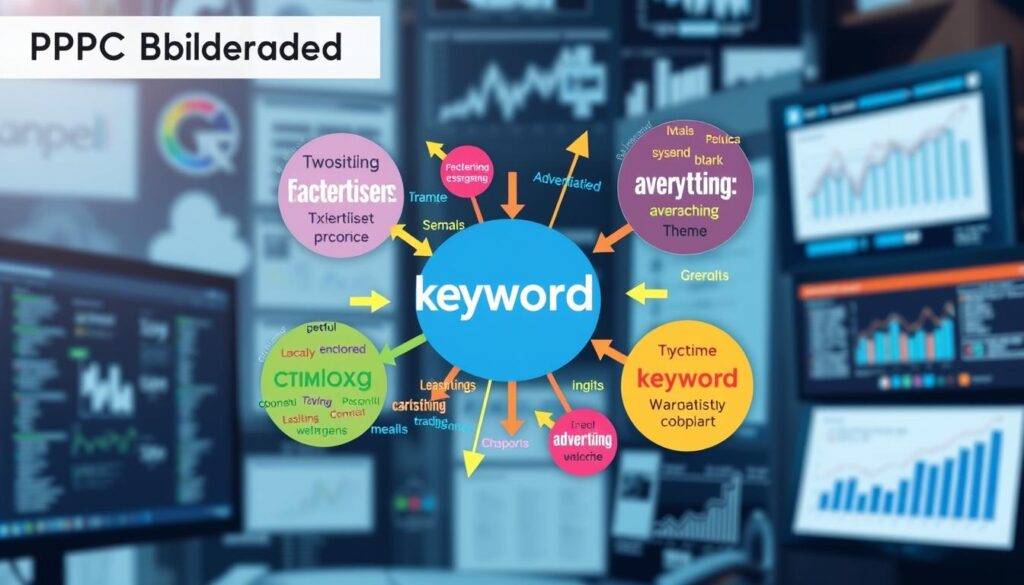Do you know how to grab nearly half of your audience’s clicks? Mastering PPC bid management is key to success in Google Ads. It’s not just for the analytical; it’s for anyone who wants to win big. Keywords are powerful tools that can make or break your campaign.
At our agency, we don’t just set budgets for keywords. We watch and adjust them closely. This keeps our clients at the top of search results and in customers’ minds. We’ll show you how to get more clicks, leads, and use advanced bidding techniques to boost your ads.
Key Takeaways
- Understanding the pivotal role of top ads in securing 46% of the clicks.
- Emphasizing strategic bid management including CPC, CPM, and CPA types.
- Utilizing automated bidding to maximize conversions or minimize costs.
- Implementing ongoing analysis and A/B testing to refine PPC strategies.
- Learning how ad auctions work and how they evaluate bids and ad quality.
- Recognizing that every PPC dollar spent can double in business profit.
Understanding the Basics of PPC Bid Management
At the heart of effective digital marketing is understanding keyword bidding strategies for PPC. These strategies directly dictate the visibility and efficiency of your ads online. As you explore Google Ads bidding strategies, you’ll discover that each approach serves different ends—from maximizing ad exposure to enhancing ROI through precise bid adjustments.
Manual bidding and automated bidding stand out as primary methods. Manual bidding gives full control, allowing advertisers to adjust bids based on detailed insights and their acute judgment. It demands considerable time and effort. Automated bidding, endorsed by figures like Bethany Bey from Hanapin Marketing, leverages algorithms to optimize bids towards set objectives, efficiently maximizing PPC bidding potential without constant human supervision.
Consider the role of bid modifiers, which refine bids allowing adjustments for specific scenarios such as device type, user location, or time of day. This granularity helps pinpoint cost-efficiency, ensuring you’re not overspending while maintaining optimal ad placement. Meanwhile, comprehensive bidding strategies like Target CPA and Maximize Conversions, as implemented in Google Ads, aim to balance expenditure against outcomes, tailoring bids to achieve specific financial objectives.
Moreover, adopting keyword bidding strategies for PPC often entails segmenting ad groups and customizing bids on a granular level to enhance ad relevance and conversion rates. Tools like Acquisio, utilized by Crystal Anderson from SEER Interactive, offer advanced bid management features that facilitate strategic bidding aligned with real-time data and campaign performance.
| Strategy | Core Focus | Usage Example |
|---|---|---|
| Manual CPC | Complete bid control | Ad groups with high importance/visibility |
| Target CPA | Cost per Acquisition | Bethany Bey’s strategy for goal-oriented accounts |
| Maximize Conversions | Conversion maximization | High conversion potential campaigns |
| Acquisio | Customizable bidding schedules | Crystal Anderson’s approach to controlled bidding |
Ultimately, succeeding in PPC requires understanding your options, continuous testing, and thoughtful application of Google Ads bidding strategies. From the initial keyword selection to final bid optimizations, each choice plays a vital role in maximizing PPC bidding efforts to turn clicks into meaningful engagements and transactions.
Strategizing Your Keyword Bidding for Competitive Advantage
In PPC advertising, getting ahead means knowing how to bid on keywords well. By studying keyword performance and using advanced auction techniques, businesses can boost their online presence. Let’s explore how to improve your PPC bidding for a competitive edge.
Analyzing Keyword Performance and Competition
To stay ahead, it’s key to use smart bidding based on keyword data. Tools like Google Keyword Planner or SEMrush help find important keywords. This lets us set bids to grab user attention without wasting money. Keeping an eye on keyword effectiveness is also crucial to stay on top of the market.
Assessing Keyword Relevancy for Higher Conversion Rates
Relevance is key to PPC success. By focusing on keywords that match your products or services, you improve your ad’s quality and relevance. This makes your ads more likely to show up in searches that matter to your business. Using long-tail keywords can also increase your campaign’s success, leading to more conversions.

Grouping related keywords can also boost your campaign’s performance. This strategy improves ad relevance and helps manage your budget better. Here’s a comparison of PPC strategies to help you choose the best one for your goals.
| Strategy | Usefulness | Best for |
|---|---|---|
| Manual CPC | High control over bids | Campaigns where precise bid adjustments are critical |
| Enhanced CPC (eCPC) | Adjusts bids to maximize conversions | Conversion-focused campaigns |
| Target CPA | Optimizes for acquisition costs | Specific engagement actions |
| Target ROAS | Focuses on return from ad spend | Maximizing profits from ad spend |
| Maximize Clicks/Conversions | Automatically sets bids to increase visits or conversions | Boosting site traffic or specific conversion goals |
By mastering keyword bidding and using smart tactics, we aim to improve visibility and save costs. Through ongoing learning and adapting to auction techniques, you can achieve and surpass your advertising goals. This will set a new benchmark in your field.
Enhancing Your Google Ads Bidding Strategies
Effective google ads bidding strategies are key to better PPC campaigns. Knowing how different strategies affect your ads helps you make better choices. This way, you can improve your PPC bid management.
Picking the Right Bidding Strategy for Your Campaign Goals
Choosing the right bidding strategy is vital for the best PPC results. Google Ads has many options for different goals. Smart bidding like CPC, CPM, and CPV can greatly improve your campaign.
Utilizing Smart Bidding for Automated Optimization
Smart bidding in Google Ads adjusts bids in real-time for better ad spend. It uses machine learning to predict which ads will convert best. This way, it helps you get the most from your budget.
| Strategy | Objective | Description |
|---|---|---|
| Maximize Clicks | Traffic | This automated strategy aims to secure as many clicks as possible within your designated budget. |
| Target CPA | Conversions | Seeks to convert users at a specific cost-per-action rate, which you set as a target to be met. |
| Target ROAS | Revenue | Designed to achieve a specified return on ad spend, ideal for campaigns where sale conversion drives profit. |
| Target Impression Share | Visibility | Focuses on improving brand visibility by aiming to place your ad on the top of the page in a certain percentage of searches. |
By choosing maximizing ppc bidding and using strategies like Target CPA and Target ROAS, we optimize your budget. This approach helps you stand out in the Google Ads world.
Maximizing PPC Bidding with Strategic Keyword Grouping
In our quest for top PPC campaign results, focusing on effective PPC bidding tactics is key. By grouping keywords smartly, our ads become more relevant and engaging. Around 80% of companies stress the need for custom Google Ads plans, showing how crucial it is to fine-tune keyword bids.
Improving ad relevance through keyword grouping requires deep analysis and sorting. Metrics like CPC, CPM, and CPA are vital. Effective grouping leads to better targeting and budget use, boosting your PPC campaign’s ROI.

Google Ads provides bid management tools like Manual CPC and Target CPA. By grouping keywords, we can optimize these tools. This streamlines management and boosts ad Quality Scores, lowering costs.
- The goal is to adjust PPC bids to match ad spend with expected outcomes.
- Targeting keyword competition helps us set bids wisely, balancing visibility and cost.
- Using data from performance metrics helps make decisions that align with campaign goals.
To excel in keyword bidding strategies for PPC, it’s essential to keep monitoring and refining keyword groups. This approach helps stay competitive by keeping ads relevant and engaging. Remember, the secret to successful PPC bidding is not just picking the right keywords but how we group and bid on them.
Effective PPC Bidding Tactics for Cost-Efficiency
In the world of digital ads, knowing how to manage PPC bids is key. It helps keep costs down while still getting great results. We use the latest strategies and data to make sure our bids are just right. Our goal is to get the best return on our ad spend and use smart keyword bidding.
Optimizing Bids for Better ROAS
To get better ROAS, we start by picking the right bidding strategy. The Maximize Conversions strategy is a big help when we want to get as many conversions as possible. The Enhanced Cost Per Click (ECPC) strategy is also great. It lets us adjust bids manually and automatically, keeping our budget and performance in balance.
Implementing Bid Adjustments Based on Campaign Data
Adjusting bids based on data is a big part of our strategy. We look at how our campaigns are doing and make changes as needed. For example, using the Maximize Clicks strategy helps us get more people to see our ads, which can lead to more clicks.
We also do other things to help our PPC campaigns:
- Using Target Impression Share to boost brand visibility.
- Adopting Manual CPC for granular control over individual keyword bids.
- Refining our demographic and location targeting to optimize spending on high-performing markets.
Small businesses need to watch their PPC budget closely. A few mistakes can hurt their growth. That’s why we tailor our strategies and budget carefully, and smart keyword bidding is key to success.
| Bidding Strategy | Primary Goal | Benefits |
|---|---|---|
| Maximize Conversions | Drive Max Conversions | Higher conversion rate within budget |
| ECPC | Balance between manual and automatic bidding | Optimizes conversions with control over bid adjustments |
| Maximize Clicks | Increase Visibility | Automatically adjusts to garner more clicks |
| Target Impression Share | Enhance Brand Presence | Ensures ads are prominently displayed |
| Manual CPC | Direct Control | Enables strategic adjustments for specific keywords |

Core Components of a Successful PPC Bid Management Plan
To succeed in PPC bid management, you need to do thorough research, create engaging ads, and bid strategically. It’s also important to keep an eye on your campaign’s performance and make changes as needed. Understanding how to bid effectively and connect with your audience through ads is key. Here are the main parts that help you get the most out of your PPC bids.
First, setting clear goals for each campaign is essential. Your goals might be to boost brand awareness, drive traffic, generate leads, or increase sales. Each goal needs a specific approach to bidding and ad placement. By using strategic keyword bidding, you can target the right audience, making your campaign more effective.
For strategies focused on conversions, like maximizing revenue or profitability, you need to pay close attention to metrics like ROAS and CPA. Using tools like Google’s Flexible Bid Strategies helps manage bids at a detailed level. This way, you can optimize for specific goals.
Data is crucial in refining your PPC strategies. Understanding how to interpret data helps you make better decisions. Here’s a structured guide on how to match campaign goals with the right bidding strategies based on different metrics:
| Goal | Key Metric | Bidding Strategy |
|---|---|---|
| Increase Branding | Impressions, CPM | Portfolio Bidding |
| Increase Site Traffic | Clicks, CPC | Rule-Based Bidding |
| Increase Leads | Conversions, CPA | Target CPA |
| Increase Sales | Conversions, ROI | Target ROAS |
Managing bids with limited data can be tough. But, by analyzing longer data ranges or using bid grouping and optimization with machine learning, your campaign can still do well.

In PPC advertising, always be ready to test and improve. Learning from each ad’s performance and making smart adjustments can help you reach your goals. Using PPC bidding tips, strategic keyword bidding, and refining your strategies based on data are key to staying competitive in PPC campaigns.
Keyword Bidding Strategies for PPC: Driving Targeted Traffic
PPC advertising is always changing. Businesses must update their keyword bidding strategies to reach their audience well. By matching these strategies with their goals and adjusting bids for different campaigns, companies can spend their ad money wisely and improve their results.
Aligning Bidding Strategies with Business Goals
To get the right traffic, it’s important to match PPC bidding strategies with business goals. Whether you want to sell more, get more leads, or boost your brand, each goal needs a different plan. For example, to sell more, choose high-intent keywords and bid higher to stay ahead.
For brand awareness, use broader keywords at a lower cost to reach more people. Knowing these differences and aligning them with clear goals is crucial for success.
Tailoring Keyword Bids for Various Campaign Types
Customizing bids for different campaign types is another key to success. Choose between manual, automated, and enhanced CPC strategies based on your campaign’s nature and targeting. For local campaigns, use geographically relevant keywords with adjusted bids to save money and be more effective.
For big campaigns, mix CPM and CPC bidding to balance cost and reach. This ensures each click is valuable and leads to conversions.
- Manual Bidding: Direct control over each keyword’s maximum cost.
- Automated Bidding: Uses algorithms for adjusting bids based on campaign goals.
- Enhanced CPC (ECPC): Adjusts manual bids using historical performance data to improve chances of conversion.
By balancing PPC ad auction techniques with business goals, each click can lead to a sale. Watching performance metrics and adjusting bids is key to keeping costs down and reach high.
Also, getting help from PPC experts can make things easier. They use industry insights and data analytics to improve your campaigns.

By using smart PPC bidding tactics, businesses can stay ahead in their markets. Ads that engage, targeted keywords, and smart bid adjustments lead to better campaigns and more efficient ad spending. This careful planning and ongoing management lead to better ROI and meet business goals.
Advanced PPC Ad Auction Techniques and Best Practices
Learning PPC ad auction techniques is key for better ad visibility and success. Knowing ppc bidding tips and keyword bidding strategies for PPC helps spend money wisely. It also boosts ad placement and campaign results.
Success comes from using data wisely. Google Ads says using automated bidding strategies like Maximize Conversions can help. These strategies adjust bids in real-time, based on many factors.
Using manual keyword bidding strategies for PPC is also smart. Tools like SEMrush or Ahrefs help find hidden gems. This way, you find keywords that are less competitive but still valuable.
Using direct-response copywriting in ads is crucial. It aims to get people to act fast. Ads that touch emotions can see a 15% increase in revenue, as Nielsen found.
Creating ads that look the same on all platforms is smart. It makes ads more effective and strengthens your brand. This way, your ad spend goes further.
Finally, KYW Digital says A/B testing is key. It helps improve ppc ad auction techniques by analyzing important metrics. This keeps your ads fresh and effective.
Improving Ad Performance with Data-Driven Bid Adjustments
Maximizing PPC bidding outcomes is a mix of art and science. It uses key data insights to improve bid strategies. Good ppc bid management cuts costs and boosts ad campaign performance. It ensures ads are in the best spots and target the right audience.
Adjusting bids at the ad group and keyword level is crucial. We tailor bids based on performance data and market conditions. For example, with ad groups hosting about 20 keywords, we focus on top-performing keywords. This makes our campaigns more competitive and targeted.
Bid simulators and adjustable metrics are key tools. Historical data-driven simulators show how bid changes might affect us. They help us make better decisions for more efficient bids.
| Adjustment Type | Range |
|---|---|
| Device Bid Adjustment | -100% to +900% |
| Location Bid Adjustment | -90% to +900% |
| Ad Scheduling Bid Adjustment | -90% to +900% |
| Remarketing Lists for Search Ads (RLSA) | -90% to +900% |
Using PPC bidding tips with automated strategies like Target CPA and ROAS boosts efficiency. These smart systems adjust bids for us. They help us focus on big-picture decisions, not just tweaking numbers.
In conclusion, the range of bid adjustments shows how flexible we need to be. These changes are key to aligning bids with campaign goals. They help us maximize PPC bidding outcomes through smart, data-driven choices.
Diving Deep into PPC Bidding Tips and Tricks
Exploring PPC bidding tips and effective PPC bidding tactics is key. Understanding strategic keyword bidding for PPC boosts your ads. Bidding affects where your ad shows up and how well it does.
Exploring Bid Modifications for Seasonal Trends
Seasonal trends are crucial in PPC campaigns. Knowing these trends helps us adjust bids to get more visibility when it’s busy. This way, you’re not just in the ad auction, but you’re ahead when it counts.
Using a Time of Day Bidding Strategy or Position-Based Bidding Strategy during busy times can improve your ad’s performance. You’ll see better click-through rates and overall ad success.
Benefiting from Long-Tail Keyword Bids in Niche Markets
In niche markets, long-tail keywords are very helpful. They’re less competitive and more specific, leading to lower costs and higher conversions. A manual bidding strategy or enhanced Cost-Per-Click (ECPC) helps make precise bids for your audience’s needs.
Here’s a look at different bidding strategies and when to use them:
| Bidding Strategy | Focus | Use Case |
|---|---|---|
| Manual Bidding | Control and Flexibility | Perfect for niche markets where real-time adjustments are crucial |
| Automated Bidding | Efficiency through Machine Learning | Great for large campaigns aiming for broad objectives like Maximize Clicks |
| Portfolio Bidding Strategy | Resource Allocation across Portfolio | Useful for managing multiple campaigns under a single budget |
| Target Return on Ad Spend (tROAS) | Maximize Returns | Ideal when the main goal is maximizing financial returns on ad spend |
| Enhanced CPC (ECPC) | Conversion Optimization | Best for campaigns focused on conversions, adjusting bids for clicks likely to convert |
Using the right mix of strategies can greatly improve your campaigns. Whether it’s adjusting bids for seasonal spikes or using strategic keyword bidding for PPC in niche areas, each tweak is vital in digital advertising.
Crucial Insights for Maximizing PPC Bidding Outcomes
The world of Google Ads is always changing. We’ve studied 14,584 accounts to learn how to improve PPC bidding. Our findings show how different strategies can greatly affect campaign success.
Our research found that 48.42% of advertisers use more than one bidding strategy. This approach can lead to better results than sticking to just one. It shows the importance of adapting to the complex world of PPC bid management.
Conversion tracking is key, with 61.58% of accounts using it. It helps advertisers see how well their campaigns are doing. This tracking is essential for making smart bid adjustments and improving PPC outcomes.
Choosing the right bidding strategy can make managing campaigns easier and increase revenue. For example, Max Conversion Value often outperforms Max Conversions in important metrics like ROAS and CPA.
Manual CPC is also effective, especially when you need to control bids. This suggests that a mix of manual and automated methods can be beneficial.
However, setting strict bidding targets can actually hurt performance. This highlights the need for flexibility in PPC campaigns to keep up with market changes.
Our study also clears up myths about bid caps. Most successful accounts don’t use them and find no real benefit. But, finding the right bid amount, especially in smart bidding, can make campaigns more effective.
| Bidding Strategy | Effective Spend Range | Performance Metrics |
|---|---|---|
| Manual Bidding | N/A | Strong in CPC, Varies in CPA and CTR |
| Smart Bidding | $10,000 – $50,000 | Optimal for Profitability |
| Max Conversion Value | Varies | Superior in ROAS, CPA, CPC |
This focused, data-driven method makes PPC bid management easier and boosts campaign success. By applying these insights, we can stay ahead in the digital marketplace.
Conclusion
In our look at keyword bidding strategies for PPC, we’ve highlighted the importance of smart, data-driven approaches. Choosing high-intent keywords is key. They guide potential customers who are ready to buy straight to your site. These keywords make your ads more relevant, increasing the chances of clicks and sales.
Good PPC bidding is about picking the right keywords and adjusting bids to get the most out of them. Long-tail keywords, for example, are specific and less competitive, leading to higher conversion rates. By tracking performance and adjusting bids, you can find the right balance between cost and visibility.
Our journey through PPC has shown the power of constant optimization. By making regular bid adjustments and crafting compelling ad copy, we can make our brands stand out in digital marketing. The strength of keyword bidding strategies for PPC is clear. It’s up to the savvy advertiser to use this power for the best results.
FAQ
What are the fundamental aspects of PPC bid management?
PPC bid management starts with a good keyword list. It also means researching competition and costs. You need to adjust your bids to stay competitive in search engine marketing (SEM).
How can keyword performance and competition analysis improve our PPC strategy?
Looking at keyword performance and competition helps us make smart bid choices. We can spend more on keywords that work well. This makes our ads more relevant and boosts conversion rates.
What are some effective Google Ads bidding strategies?
Good Google Ads strategies include setting clear goals and choosing the right bid type. Options like CPC, CPM, or CPA work well. Using AI for automated bid optimization can also improve ROI.
Why is strategic keyword grouping important in PPC campaigns?
Grouping keywords strategically is key. It helps create more relevant ad groups. This leads to higher click-through rates and better budget use, improving conversion rates.
How can we enhance PPC bidding tactics for better cost-efficiency?
To be more cost-efficient, optimize bids for better ROAS. Use real-time data for bid adjustments. Focus on keywords that bring in profit.
What are the core components of a successful PPC bid management plan?
A good PPC plan involves thorough research and compelling ads. It also means setting bids strategically and monitoring and adjusting often. Focus on relevance and audience engagement for the best results.
How do we tailor our keyword bidding strategies to drive targeted traffic?
To target traffic well, align bids with your campaign goals. Tailor bids for different campaign types. This ensures your ads are relevant and your quality score is high, leading to better ad spending.
What advanced PPC ad auction techniques can we employ?
Advanced techniques include focusing on ad quality and using strategic bid adjustments. Adjust bids for location, device, and timing. These strategies help secure better ad placement and improve campaign performance.
How can we use data-driven bid adjustments to improve ad performance?
Analyze metrics like click-through and conversion rates to adjust bids. This ensures your ads compete well in auctions and avoids unnecessary spending. It also improves ad position and performance.
What role do seasonal trends and niche markets play in PPC bidding strategies?
Seasonal trends can impact searches, so adjust bids during peak times. Targeting niche markets with long-tail keywords can lead to higher conversions at a lower cost due to less competition.
What insights are crucial for maximizing PPC bidding outcomes?
Key insights include understanding keyword performance and user behavior. Refine keyword selections and grouping strategies. Balance budget with campaign goals to maximize PPC success.

